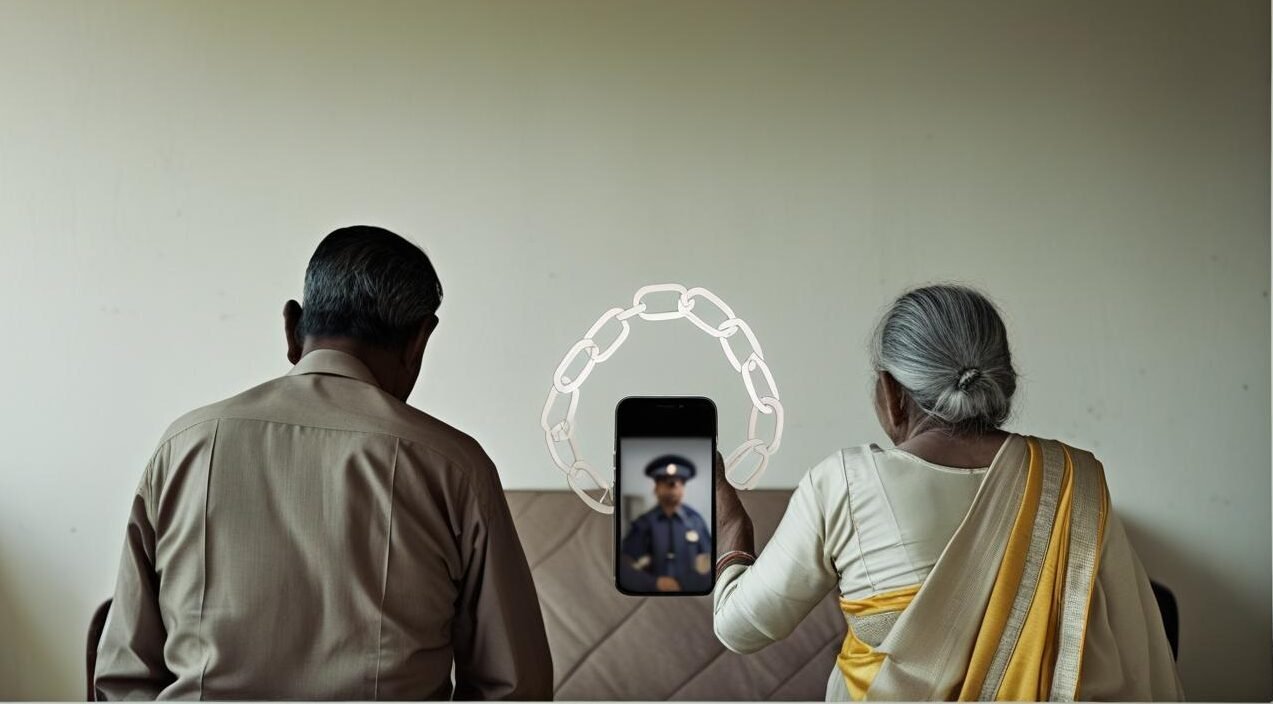In a shocking cybercrime case that underscores the growing threat of psychological manipulation in digital frauds, a retired doctor and his wife from Patna were kept under “digital arrest” for 12 days and extorted of ₹1.95 crore by cybercriminals posing as law enforcement officials. The senior couple was subjected to relentless video calls, staged courtroom visuals, and threats of legal action—forcing them to comply out of sheer fear and confusion.
The Ordeal Begins: Fake CBI Call and Courtroom Dramas
The incident began on May 21, when Dr. Radhe Mohan Prasad, a retired physician from Patna Medical College and Hospital (PMCH), and his wife Chhabi Prasad, both residents of Hanuman Nagar, received a phone call from an unknown number with a Mumbai-based code. The caller claimed to be a CBI officer and informed them that a money laundering case had been registered against them at Colaba Police Station in Mumbai.
Within hours, the couple began receiving frequent and prolonged video calls through WhatsApp, often lasting up to 15 hours, in which actors posed as police officers, CBI officials, lawyers, and judges. The cybercriminals went to extreme lengths to create realistic virtual courtrooms and police station setups on video, convincing the couple of the supposed seriousness of the allegations.
FCRF x CERT-In Roll Out National Cyber Crisis Management Course to Prepare India’s Digital Defenders
The criminals alleged that a SIM card issued in Dr. Prasad’s name using his Aadhaar number had been linked to multiple financial crimes. The couple was warned of immediate arrest and severe legal consequences if they did not comply with instructions.
Round-the-Clock Surveillance and Fear-Based Compliance
According to DSP Raghwendra Mani Tripathi, in charge of the Cyber Police Station in Patna, the couple was placed under what is being termed as a “digital arrest” from May 23 to June 5. During this time, they were subjected to constant surveillance via video calls, cutting them off from any contact with the outside world, including their own children.
Out of panic and under the illusion of being in legal jeopardy, the couple visited their bank on six different occasions and made RTGS transfers totaling ₹1.95 crore to the fraudsters. The funds were transferred in multiple installments over nearly two weeks.
Their son, Dr. Saurabh Mohan, also a medical professional, said, “My parents were terrified. They didn’t tell anyone, including me, because they were made to believe the entire matter was confidential and monitored by central agencies.”
The emotional and psychological manipulation left the couple traumatized and unable to distinguish between reality and fraud, until they eventually grew suspicious and approached the cyber police on June 5.
Investigation Underway: Multiple Numbers and Fake Setups Identified
The Patna Cyber Crime Unit has registered an FIR and initiated a detailed probe into the incident. DSP Tripathi confirmed that three phone numbers used during the scam have been identified, all of which were used for WhatsApp-based video calls.
“We are currently analyzing call detail records (CDRs) and technical metadata to trace the origin of the fake setups shown in the video calls,” said Tripathi. “The criminals made elaborate use of digital backdrops and impersonation to carry out a convincing psychological operation.”
The incident has once again brought attention to a growing trend of “digital arrest scams”, where vulnerable victims—particularly senior citizens—are isolated and manipulated using fake identities and fear tactics.
Algoritha: The Most Trusted Name in BFSI Investigations and DFIR Services
Growing Trend: Psychological Manipulation in Cybercrime
This case is part of an alarming rise in cybercrimes where social engineering, impersonation, and mental intimidation are used more than technical exploits. The use of deepfake-like video simulations, fake court visuals, and 24×7 surveillance suggests that cybercriminals are evolving beyond conventional phishing or malware-based attacks.
The Patna incident highlights an urgent need for awareness campaigns, rapid response systems, and tech-enabled investigation units to counter such advanced psychological scams.
Citizens are advised to never transfer funds or disclose personal information based on telephonic or video call threats. All legal notices, police actions, and court summons follow formal, verifiable procedures.
If you or someone you know receives such a suspicious call, immediately report it to the National Cyber Crime Reporting Portal (cybercrime.gov.in) or contact the nearest Cyber Police Station.
For any cyber fraud-related assistance, call the helpline 1930.



